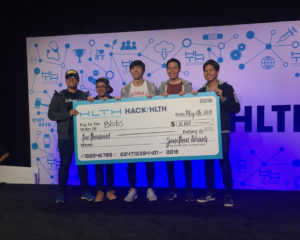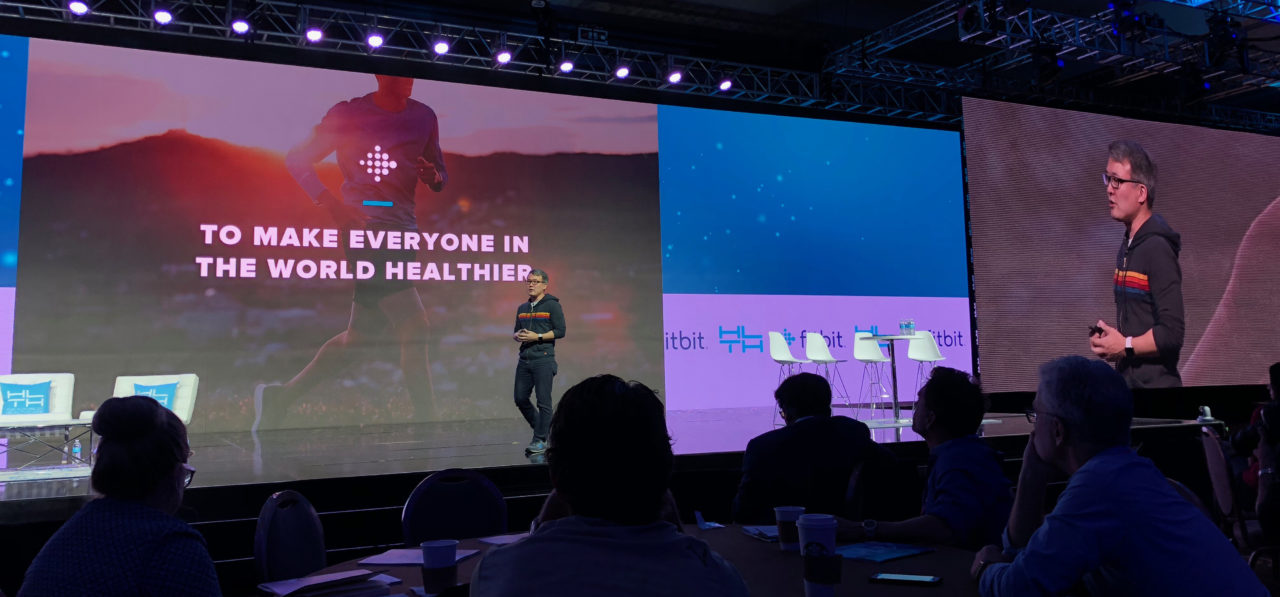HLTH Recap: 6 Key Takeaways From The Future Of Healthcare Event
This past week, the Fitbit team was in Las Vegas for HLTH: The Future of Healthcare event. The multi-day event kicked off with a hackathon which led into full-day sessions led by thought leaders across the healthcare landscape, from startups to industry giants.
If you weren’t able to attend, check out our HLTH recap of key takeaways:
Engagement vs. connection. Asked during a panel what industry buzzword they disliked most, executives from Castlight Health, Limeade, Grand Rounds, and Maestro Health suggested “engagement” – especially when it comes to one’s health condition. One panelist joked, “Engagement is something I fear my daughter will do soon.”
Kidding aside, another panelist offered an alternative word: connection. Rob Butler, CEO of Maestro Health posits that people don’t really want to be engaged with their health condition; instead, they want to be connected to the health system and their support network.
And in a different session, Kimon Angelides, founder and CEO of Vivante Health, suggested, “People with chronic conditions don’t want to be more engaged with their disease – they want to reduce the hassles and be more empowered… and technology can help in this journey.”
Wearable technology can help patients and healthcare providers: In a keynote address, Fitbit co-founder and CEO, James Park, presented on how the company is deepening its reach within healthcare, from Fitbit’s work with clinical research, such as with the involvement with the National Institutes of Health’s All of Us research program, to its work with health plans, like UnitedHealthcare Motion, and more. He highlighted the fact that 6.8 million Fitbit users are connected to population health and health management platforms.
Park also announced the company’s new health-focused apps and clock faces that are available now or will soon be available, including ones from Dexcom, Diplomat, Fitabase, Humana, Limeade, One Drop, Sickweather, and Walgreens. Fitbit smartwatch users will soon have new options to improve wellness and help manage conditions, like diabetes and some types of cancer.
In a later panel, executives from Nokia, Verily Life Sciences and Garmin Health discussed not only wearable data and insights, but rather the importance of making this data meaningful to users, giving them ways to interact with their data to ultimately drive patient engagement.
 Health-focused entrepreneurs are eager to disrupt healthcare: During HackHLTH, participants had 36 hours to create and present their health-focused product. The overall winning app? Zen, which aims to help people suffering from anxiety attacks with real-time guided breathing exercises. The vision is that Zen will combine a user’s real-time Fitbit data with genetic information from Helix, and supercharge that with geolocation data from Google Maps.
Health-focused entrepreneurs are eager to disrupt healthcare: During HackHLTH, participants had 36 hours to create and present their health-focused product. The overall winning app? Zen, which aims to help people suffering from anxiety attacks with real-time guided breathing exercises. The vision is that Zen will combine a user’s real-time Fitbit data with genetic information from Helix, and supercharge that with geolocation data from Google Maps.
Fitbit was one of the hackathon sponsors and crowned Blobs the winner in the Fitbit challenge. In fact, 26 teams signed up to code digital health apps on FitbitOS and the Fitbit Web API within the span of two days. The idea behind Blobs is to provide an app for people with diabetes that delivers a gamified diabetes management experience. In the app experience, “Blobs” would be virtual pets that could help Fitbit users reach their health milestones.
The need to manage multiple conditions: Speakers across the board acknowledged the problem of comorbidities, or the simultaneous presence of two chronic conditions in a person, highlighting the opportunity to help combat this with more holistic solutions.
Stephanie Tilenius, Founder and CEO of Vida Health, pointed to the National Health and Nutrition Examination Survey, which found that 86% of people with type 2 diabetes have another chronic condition. What’s more, she cited a finding from the National Comorbidity Survey Replication, a nationally representative epidemiological survey, that more than 68% of adults with a mental disorder also reported at least one general medical disorder.
 Personalized care for patients: New startups have been emerging to focus on people’s tailored, ever-changing needs: Papa, a company which connects seniors with college students who provide senior services; Solera, which connects people with the diabetes prevention program that best suits their lifestyle; and Zorabots, which manufactures robots to provide people with personalized comfort and care, to name a few.
Personalized care for patients: New startups have been emerging to focus on people’s tailored, ever-changing needs: Papa, a company which connects seniors with college students who provide senior services; Solera, which connects people with the diabetes prevention program that best suits their lifestyle; and Zorabots, which manufactures robots to provide people with personalized comfort and care, to name a few.
A common theme at HLTH was the vision of personalized care for all patients, whether it’s catering to their individual needs, innovating how patients and providers communicate, or moving towards the ability for patients to better own their healthcare data, especially their electronic medical records (EMRs).
Big players to watch out for: And while HLTH boasted a speaker roster of various startups of different sizes, many acknowledged that the big players can’t be ignored. Some companies that were name-dropped? CVS, Walmart, and the joint venture of Amazon, Berkshire Hathaway, and JP Morgan.
In fact, CVS Health Chief Medical Officer Troyen A. Brennan, M.D. took the stage to discuss the company’s upcoming plans to address population health – targeting three groups of patients: those with five common chronic diseases (diabetes, hypertension, hyperlipidemia, asthma and depression); patients who disproportionately drive a large percentage of total health care costs; and patients transitioning back home from a hospital setting.
This article is not intended to substitute for informed medical advice. You should not use this information to diagnose or treat a health problem or condition. Always check with your doctor before changing your diet, altering your sleep habits, taking supplements, or starting a new fitness routine.



